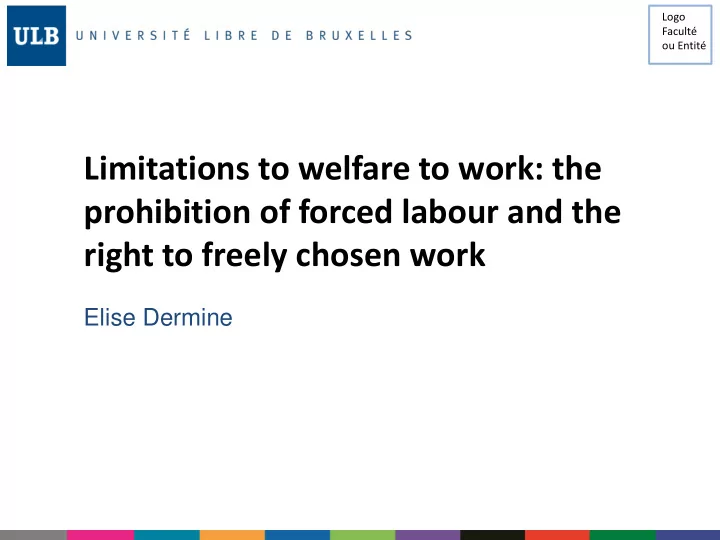

Logo Faculté ou Entité Limitations to welfare to work: the prohibition of forced labour and the right to freely chosen work Elise Dermine
Research question • The justification of WTW from a legal perspective – human rights • Two specific issues – Chapter 1: conditions under which WTW could eventually find their foundation on the right to work (right as goal) – Chapter 2: limits set by the prohibition of forced labour and the right to freely chosen work to WTW (right as limit)
Material The international human rights case law on the prohibition of forced labour and on the right to freely chosen work Prohibition of forced labour • proclaimed in international covenants dedicated to civil and political rights (Art. 4, par. 2 and 3 of ECHR and Art. 8, par. 3 of the ICCPR) • included in the right to freely chosen work Right to freely chosen work • Component of the right to work proclaimed in international covenants dedicated to social rights (Art. 1, par. 2 of the ESC and Art. 6 of the ICESCR) • enlarged protection of the freedom of work
Research results • The emergence of a proportionality criterion in the general case law • The embodiment of the proportionality requirement in the specific case law • Identification of six criteria for assessing the conformity of WTW measures with the prohibition of forced labour and the right to freely chosen work
CRITERA ITEMS 1. Quality of work in the programme • Working conditions • Level of remuneration • Severity and number of sanctions 2. Exit options secured to the in practise • Right to means of subsistence participants during the sanction • Possibility to refuse to take part in the programme for various reasons (physical, psychological situation or family situation…) • Criteria for assigning participants 3. Capability for voice guaranteed to social assistance recipients to work (personal preference, qualifications, transportation, abilities, etc.) • Right to appeal an independent body
• Duration of the work programme 4. Time to train and to look after a • Number of working hours regular job • Positive impact of the programme 5. Goals and effects of the on the participants’ chances of programme finding regular employment • Impact analysis of the programme • 6. Procedural requirements Examination of existing concerning the adoption of the alternatives • programme Consultation of social assistance recipients
Recommend
More recommend